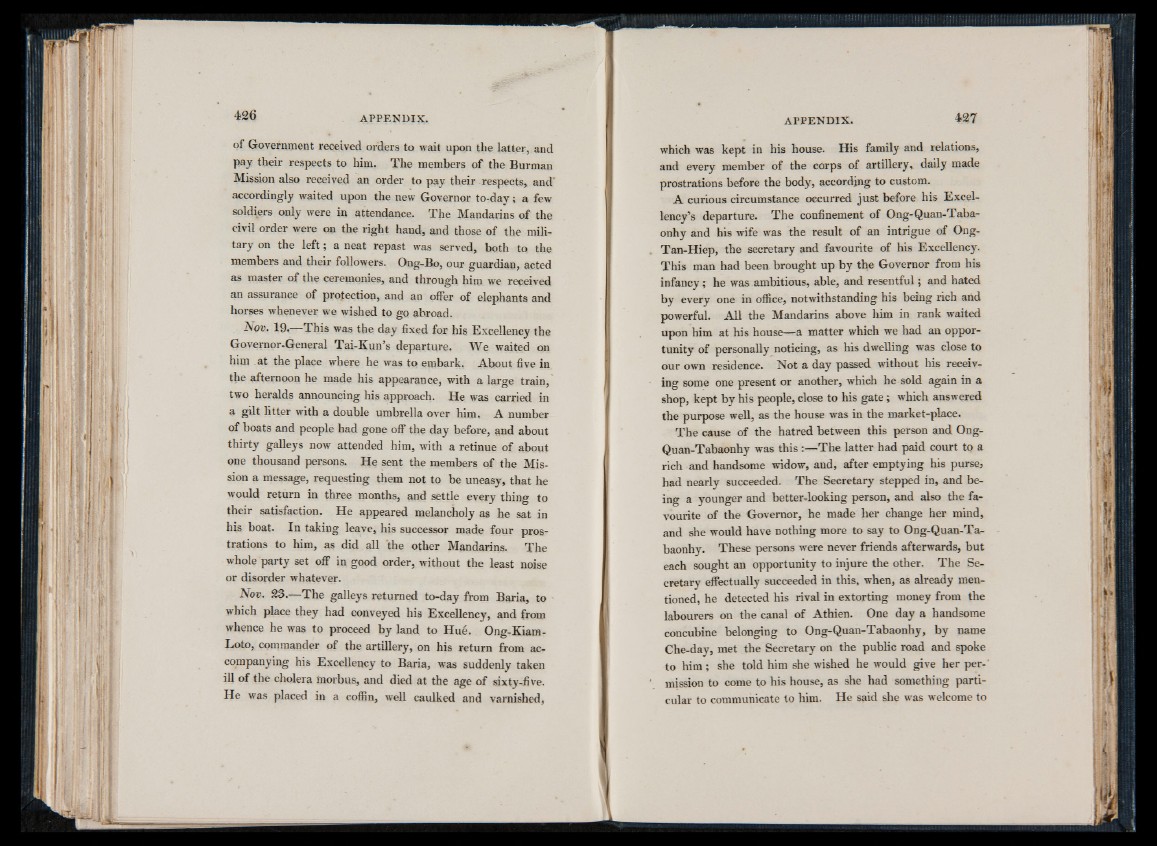
of Government received orders to wait upon the latter, and
pay their respects to him. The members o f the Burman
Mission also received an order to pay their respects, and'
accordingly waited upon the new Governor to-dav; a few
soldiers only were in attendance. The Mandarins of the
civil order were on the right hand, and those o f the military
on the le f t ; a neat repast was served, both to the
members and their followers. Ong-Bo, our guardian, acted
as master o f the ceremonies, and through him we received
an assurance o f protection, and an offer of elephants and
horses whenever we wished to go abroad.
Nov. 19, This was the day fixed for his Excellency the
Governor-General Tai-Kun’s departure. W e waited on
him at the place where he was to embark. About five in
the afternoon he made his appearance, with a large train,
two heralds announcing his approach. He was carried in
a g ilt litter with a double umbrella over him. A number
o f boats and people had gone off the day before, and about
thirty galleys now attended him, with a retinue o f about
one thousand persons. H e sent the members o f the Mission
a message, requesting them not to be uneasy, that he
would return in three months, and settle every thing to
their satisfaction. H e appeared melancholy as he sat in
his boat. In taking leave, his successor made four prostrations
to him, as did all the other Mandarins. The
whole party set off in good order, without the least noise
or disorder whatever.
Nov. 23.— The galleys returned to-day from Baria, to
which place they had conveyed his Excellency, and from
whence he was to proceed by land to H u e . Ong-Kiam-
Loto, commander o f the artillery, on his return from ac-
companying his Excellency to Baria, was suddenly taken
ill o f the cholera morbus, and died at the age o f sixty-five.
He was placed in a coffin, well caulked and varnished,
which was kept in his house. His family and relations,
and every member of the corps o f artillery, daily made
prostrations before the body, according to custom.
A curious circumstance occurred just before his Exc ellency’s
departure. Th e confinement of Ong-Quan-Taba-
onhy and his wife was the result o f an intrigue o f Ong-
Tan-Hiep, the secretary and favourite of his Excellency.
This man had been brought up by the Governor from his
infancy; he was ambitious, able, and resentful; and hated
by every one in office, notwithstanding his being rich and
powerful. A ll the Mandarins above him in rank waited
upon him at his house—a matter which we had an opportunity
o f personally noticing, as his dwelling was close to
our own residence. No t a day passed without his receiving
some one present or another, which be sold again in a
shop, kept by his people, close to his g a te ; which answered
the purpose well, as the house was in the market-place.
T h e cause o f the hatred between this person and Ong-
Quan-Tabaonhy was this :— T h e latter had paid court to a
rich and handsome widow, and, after emptying his purse,
had nearly succeeded. The Secretary stepped in, and being
a younger and better-looking person, and also the favourite
of the Governor, he made her change her mind,
and she would have nothing more to say to Ong-Quan-Ta-
baonhy. These persons were never friends afterwards, but
each sought an opportunity to injure the other. The Secretary
effectually succeeded in this, when, as already mentioned,
he detected his rival in extorting money from the
labourers on the canal o f Athien. One day a handsome
concubine belonging to Ong-Quan-Tabaonhy, by name
Che-day, met the Secretary on the public road and spoke
to him ; she told him she wished he would give her permission
to come to his house, as she had something particular
to communicate to him. He said she was welcome to